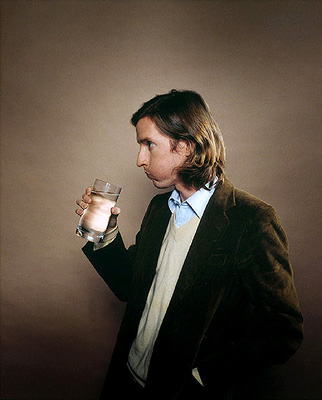There’s a moment in Wes Anderson’s The Darjeeling Limited [2007] when Francis (Owen Wilson) becomes frustrated that the spiritual journey via train that he has so carefully planned for himself and his brothers is becoming derailed. In a fit of frustration, Francis abruptly tries to rip up one of the laminated itineraries that he has produced daily for himself and his two brothers, Peter and Jack (Adrien Brody and Jason Schwartzman). This is a symbolic moment in The Darjeeling Limited; it may also be a symbolic moment in Anderson’s career: Anderson seems to be trying to break out of his obsessive/compulsive artistic groove and begin creating a more organic and authentic cinematic vision and experience. However, he hasn’t quite gotten there yet, and he knows it. His creative laminations are just too hard to tear up.
After a prologue in which their father dies, Francis decides to bring Peter and Jack together for a trip across India so that he can dissolve the alienation among the three of them and search for peace and understanding. Unbeknownst to Peter and Jack, the climax of the trip is supposed to be the finding of their mother who has run away to the Himalayas in search of her own spiritual enlightenment. There are whimsical episodes along the way that have moments of real poignancy, but the overall emotional impact of The Darjeeling Limited feels slightly hollow. It tastes more like cotton candy swirled out of strands of nothingness rather than a substantial organic apple with sugary juice dripping down the sides of one’s mouth.
Until now, Anderson’s films have become more and more hermetically sealed universes with increasingly inauthentic epiphanies. Not to say that I haven’t enjoyed each and everyone of them: Bottle Rocket [1996], Rushmore [1998], The Royal Tenenbaums [2001], The Life Aquatic with Steve Zissou [2004], and even this film. I have savored every fetishistic obsession that Anderson has with mid-60s aesthetics: graphic design replete with the ubiquitous sans serif modern font type (Helvetica?), electronics with minimalist designer shells, geometric composition, and jarring French New Wave camera movements. I get a thrill when Anderson pumps a British New Wave low-fidelity, guitar-driven song through a high-energy scene, and I get melancholy goose bumps when he layers Cat Stevens or Van Morrison through a particularly poignant one (especially when the characters are walking in slow motion). I like the aesthetic world that Anderson dwells in even though it leans towards self-indulgence. But profoundly impacting cinema aesthetic fetishes do not make.
Taking aesthetic fetishes even further, Anderson seems to have increasingly recreated his own childhood playacting throughout his films resulting in some kind of weird, feedback loop. As an adult, Anderson is having his actors playact his interpretation of the adult world that he had as a kid. So adults are playing adults but in a backyard “you be the pirate, I’ll be Jacque Cousteau in a Johnny Quest wet suit” kind of way. And because his interpretation of the adult world occurred in the mid-60s, I’m guessing, the mid-60s material fetishes with recording machines and such are a holdover. Anderson is not even recreating his childhood but his childhood fantasies and the subsequent playacting of how he imagined the adult world to be and how he imagined the adult world operates. Such is his fascination with the machinations of the adult world filtered through the eyes of a precocious child even when they don’t necessarily add significance to the story—cutouts of houses, boats, and trains seem to be a particular obssession. (Perhaps this weird feedback loop is the reason why his films are endearing to the hipster subculture: there is an aloof precociousness that fits well with the snobbish; bed-head; thick, black eyeglass wearers who want to be revered as culturally and intellectually elite while acting with child-like wonderment at the world around them as if they were socially retarded child geniuses.)
Anderson is aware of his childish whimsy and yet he and his characters have always become aware of this by the end of every film, which allows them to break out of their childish molds and gain adult wisdom. Great. They finally grow up, but with each film, the hermetically sealed universes have become more and more artificial to the point where there is really no poignancy in the end. (Did anyone actually become vaklempt when Steve Zissou finally found the shark that ate his friend and decided that revenge was not worth it?) The perfect counterpoint to Darjeeling’s spiritual quest is Into the Wild [2007]. Whereas Into the Wild left an emotional residue within me for days, Darjeeling’s emotional residue was nonexistent. Darjeeling’s spiritual quest feels too contrived. It’s beautifully contrived, yet still contrived.
Along with artifice and fetish, Anderson has also settled into other cinematic formulas of his own making hitting the same emotional notes throughout his films and exploring virtually the same themes. Variations on a theme permeate many great directors’ works but those variations usually don’t feel so similar that you feel like you have seen it all before. But with Anderson, each film increasingly seems to be the same except with different window dressing once the curtain is pulled back. Even though he is struggling with his laminated universes and behaviors and I still repeatedly watch all of his films reveling in the richness of their detail, I’m beginning to wonder when this guy is going to grow up.
Justin Baker
